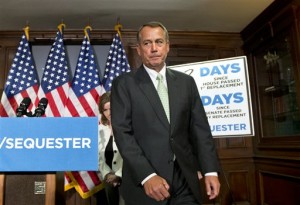Analysis: US cuts likely to hit global economy

FILE – In this Tuesday, Feb. 26, 2013, file photo, House Speaker John Boehner, R-Ohio wraps up a news conference on Capitol Hill in Washington, where he and GOP leaders challenged President Obama and the Senate to avoid the automatic spending cuts set to take effect in four days. The scheduled cuts in defense spending, unemployment benefits and other programs could slow an already struggling economy. AP
WASHINGTON — The effects of the $85 billion in US government spending cuts scheduled to begin Friday will be felt across oceans and could further hurt recession-hit European nations and burden an economically slowing China, shrinking the market for countries that depend on selling things to the United States.
Politicians and economists in Washington argue over just how badly the cuts will harm the still-weak American economic recovery, but conservative estimates forecast a half-percent dip in the US gross domestic product this year. That’s a sizeable slippage in an economy that was expected to grow by less than 2 percent.
The cuts will not hit all at once and the whole issue could be resolved by late March when the country faces another budget deadline, this time over funding for the government. Democrats and Republicans could reach a big-picture deal then that would not only avert a possible government shutdown, but also set aside the draconian cuts. President Barack Obama will discuss these budget issues when he meets Friday with Republican and Democratic congressional leaders.
But if Obama and the lawmakers don’t find a way to stop the cuts soon, the consequences could be felt worldwide.
Many Americans would have less money in their pockets and would spend less. For big exporters to the United States, like the countries of Europe and China, that would mean fewer sales to the people who live in the world’s No. 1 economy.
Beyond the dollars and cents, however, is the important issue of confidence. How, other nations ask, were US politicians unable to avoid the coming cuts? Politicians have had since 2011 to sidestep the cuts had Democrats and Republicans managed to reach a compromise on the country’s budget.
“The mechanical impact of cutting spending in a slowly recovering economy won’t be positive,” said Kent Hughes, director of the global economy program at the Woodrow Wilson Center. “All the more so will be the question of why we could not reach an agreement. That adds to international uncertainty. Europe and China are sure to feel that.”
At issue in the United States is a spiraling national debt that has surpassed $16 trillion, pushed to that extraordinary level by declining tax revenue and the vast sums of money that Obama pumped into the economy after taking office during the worst economic downturn since the 1930s. The national debt had already doubled during George W. Bush’s eight-year presidency and was about $10.6 trillion when he left office in 2009.
The coming cuts are a symptom of the intense partisan divide over how to deal with that debt. Obama insists that any resolution including tax increases on wealthy Americans in addition to spending cuts. The Republicans insist the only way to reduce debt is to cut spending, including social safety-net programs that are held dear by Obama’s Democrats. That dispute has led to a series of budget standoffs, at times putting the United States at risk of default or having to partially shut its government.
The automatic cuts that take effect Friday were conceived to resolve one such standoff two years ago. They were designed to be so distasteful to the core interests of both Republicans and Democrats that they would force the two sides to reach a budget compromise. They are supposed to stretch on for a decade, slashing an additional $1 trillion more out of federal spending. The cuts will slice a big chunk out of US defense spending and hit government programs across the board. Both parties are denouncing the cuts, but they are doing little to avoid them and are blaming each other for the impasse.
Randall Stone, a University of Rochester professor who studies the global economy, said he is concerned not only about the hit to global exports to the United States but also about the effect on global markets.
“Every financial market in the world is vulnerable, Europe in particular. It’s hard to disentangle the web and figure out the effects, but we know how deeply vulnerable the European markets are right now,” he said. “This could further delay the European recovery just long enough for something to go wrong in one country and send Europe into a severe contraction and that would have a backlash in the US”
Should the deep cuts take effect, the United States would be joining the countries of Europe where governments, by and large, have imposed painful austerity programs aimed at slashing crippling debt burdens. Those cuts, including in pension and social welfare programs, have sent poverty and unemployment soaring in the hardest hit nations like Greece and Spain. The US cuts will only compound those problems, most dramatically in the European nations that depend on exports to the America.
As the partisan fight continues, Washington has paid little attention to the global implications.
“We are the indispensable economic partner for stabilizing international cooperation and it’s scary when the US makes decisions that affect the rest of the world economy without thinking things through,” said Stone of the University of Rochester.
The Wilson Institute’s Hughes agreed:
“As a country, we are still not aware of how much we’re tied to the global economy. This is now so tied to a bitter disagreement over domestic growth that it’s pushed all those other considerations aside,” he said.














